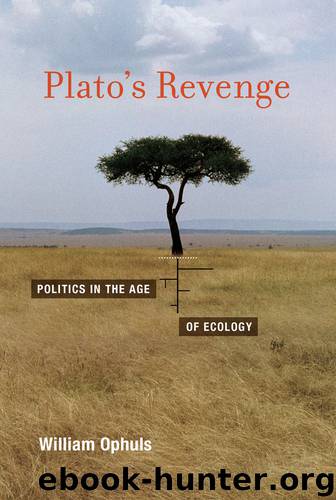Plato's Revenge by William Ophuls

Author:William Ophuls [Ophuls, William]
Language: eng
Format: epub
ISBN: 9780262297639
Publisher: The MIT Press
Published: 2011-04-04T04:00:00+00:00
6
Politeia
[An individual] might wish to enjoy the rights of a citizen without wanting to fulfill the duties of a subject, an injustice whose spread would cause the ruin of the body politic.
Therefore, in order for the social compact not to be an ineffectual formula … whoever refuses to obey the general will shall be constrained to do so by the entire body; which means only that he will be forced to be free.…
For the impulse of appetite alone is slavery, and obedience to the law one has prescribed for oneself is freedom.
—Jean-Jacques Rousseau1
Politeia is the means for realizing the ends of therapeia and paideia. Wisdom and virtue do not arise spontaneously in human beings, especially those who reside in complex civilizations, so morality must be institutionalized and inculcated by a polity dedicated to fostering and upholding society’s norms and mores. The polity’s role is to govern—to direct affairs in a way that citizens are encouraged to follow a moral code or are swiftly checked when they fail to do so. (All the rest of what we call politics is politicking, policing, and administration.) Provided that the code reflects an elevated ideal, such as excellence or wisdom, the result will be a rule of life that is relatively sane and humane.
We live at a historical juncture that will challenge governments as never before. Liberal society owes its existence to the bubble of ecological affluence fueled by the “discovery” of the New World and the exploitation of the stored solar energy in fossil fuels.2 Those who have grown up in affluent societies have therefore enjoyed unprecedented opportunities and freedoms, as well as levels of comfort and plenty all but unimaginable to our ancestors. But the impending return of ecological scarcity means that the expectations and aspirations of billions of individuals cannot be met and that individual wants will increasingly be subordinated to collective needs. Governments now confront the Herculean task of effecting an epochal economic, social, and political transition from the industrial age to the age of ecology. The question is whether this can be achieved without lapsing into totalitarian tyranny or religious despotism.
To escape such a fate will require us to break decisively with our habitual response to societal problems: passing laws that give governments ever more administrative power. The extraordinary nature of the challenge exposes us to the eternal and inescapable dilemma of politics in a particularly acute form. As Lord Acton observed, because power inevitably corrupts, no can be entrusted with it: “The danger is not that a particular class is unfit to govern. Every class is unfit to govern.”3
The maxim “That government is best which governs least” follows as a matter of course. As John Stuart Mill says in concluding On Liberty,
A government cannot have too much of the kind of activity which does not impede, but aids and stimulates, individual exertion and development. The mischief begins when, instead of calling forth the activities and powers of individuals and bodies, it substitutes its own activity for theirs.4
So the proper function of government is to facilitate, not dominate; to make the rules, not play the game.
Download
This site does not store any files on its server. We only index and link to content provided by other sites. Please contact the content providers to delete copyright contents if any and email us, we'll remove relevant links or contents immediately.
| Anthropology | Archaeology |
| Philosophy | Politics & Government |
| Social Sciences | Sociology |
| Women's Studies |
The Secret History by Donna Tartt(19088)
The Social Justice Warrior Handbook by Lisa De Pasquale(12190)
Thirteen Reasons Why by Jay Asher(8909)
This Is How You Lose Her by Junot Diaz(6886)
Weapons of Math Destruction by Cathy O'Neil(6279)
Zero to One by Peter Thiel(5801)
Beartown by Fredrik Backman(5754)
The Myth of the Strong Leader by Archie Brown(5507)
The Fire Next Time by James Baldwin(5444)
How Democracies Die by Steven Levitsky & Daniel Ziblatt(5218)
Promise Me, Dad by Joe Biden(5153)
Stone's Rules by Roger Stone(5087)
A Higher Loyalty: Truth, Lies, and Leadership by James Comey(4963)
100 Deadly Skills by Clint Emerson(4925)
Rise and Kill First by Ronen Bergman(4788)
Secrecy World by Jake Bernstein(4753)
The David Icke Guide to the Global Conspiracy (and how to end it) by David Icke(4718)
The Farm by Tom Rob Smith(4509)
The Doomsday Machine by Daniel Ellsberg(4490)
